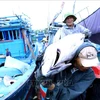Deputy director of the Ministry of Health's Food Administration, Nguyen Thanh Phong, spoke with Thoi bao Kinh te Viet Nam (Vietnam Economic Times) about efforts to ensure food safety.
* How was the nation's food safety in 2013?
Much work has been done on food safety since the beginning of the year. Many legal documents have been promulgated, such as Government Decree 38 on implementing some articles of the Food Safety Law, or Decree 178 regulating high administrative penalties for food-safety violations.
Fine levels will be increased to 200 million VND (9,500 USD) for an organisation or 100 million VND (4,750 USD) for an individual. The Government and National Assembly agreed to raise fine levels up to seven times higher than the value of any foodstuff confiscated.
In addition, supplementary penalisation will include licence withdrawal or publishing details of the violation in the mass media.
Since we started promoting food hygiene rules through communications and inspections, the situation has greatly improved.
However, there are many violations, such as the use of food additives, smuggled goods, and the slaughtering of animals that need to be more tightly controlled and more effort will be needed.
* The discoveries of unsafe food have been small compared to the overall amount that appears to be circulating. Why?
The number of violators that have been penalised doesn't reflect reality. In fact, many violations have been poorly handled.
Food processing at home and inadequate awareness by the public has created many difficulties for inspectors to do their jobs.
* What do you think about shortcomings in food-safety management?
There are many risks associated with processing, delivering, storing and preparing food. World Health Organisation statistics show that about 10 percent of people in developing countries, including Vietnam, are affected by unsafe food at times.
In Vietnam, many households involved in food processing follow traditional methods. Small-scale production and eating fermented pork rolls or raw fish could create high risks of food poisoning. People should be encouraged to change those habits and choose less risky food.
In addition, investment in food-safety management is modest. Unsanitary conditions need to be tightly controlled to prevent threats to large sections of the people. It is acknowledged that food-safety workers are in short supply and weak in professional quality because many provincial food-administration units are new. This is a big shortcoming in making inspections and handling violations.
* How will food safety management, inspections and supervision be implemented during the final weeks of the year?
From now to the end of the year, especially before the Tet period, food demand is high. The wet weather in the north could lead to the development of mould, especially in beans and seeds containing oil, such as sunflowers and pumpkin seeds. In the south, food like meat, egg and milk easily deteriorate in hot weather.
We are advising the health ministry to issue a plan for strengthening food safety during Tet. Activities will be focused on strengthening community knowledge on choosing, cooking and preserving food safely.
Inspections, quality control and check on smuggling will be tightened throughout the country. We will establish eight or nine key inspection teams to help provincial, district and communal inspection authorities.-VNA



















